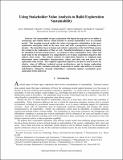Using Stakeholder Value Analysis to Build Exploration Sustainability
Author(s)
Rebentisch, Eric S.; Crawley, Edward F.; Loureiro, Geilson; Dickmann, John Q.; Catanzaro, Sandro N.
DownloadSECRebentisch.pdf (421.5Kb)
Terms of use
Metadata
Show full item recordAbstract
The sustainability of space exploration will depend in large part on its ability to
consistently and reliably deliver valued benefits to societal stakeholders over an extended
period. This on-going research studies the values of prospective stakeholders in the space
exploration enterprise—both in the near term and with a perspective extending over
decades. The immediate focus is human and robotic exploration of the Earth/Moon system,
but extends to the exploration of Mars as well. Potential beneficiaries of space exploration
are identified in broad societal sectors. An analysis of these stakeholders, their values and
needs leads to the development of a comprehensive set of space exploration objectives that
address those needs. The relative priority of exploration objectives is weighted using
information about stakeholder characteristics, values, and their role and place in the
exploration value stream. The weighted exploration objectives can then be used to assess the
relative value of different technical system architectures, and to design exploration
enterprise architecture, attributes and policy frameworks to enable value delivery to societal
stakeholders. Ultimately, through stakeholders’ continuing support, sustainable space
exploration will be delivered.
Date issued
2004Keywords
space exploration, stakeholder, value, sustainability
Collections
The following license files are associated with this item: